As a recruiter, you've likely faced the challenge of hiring a Business Analyst who can truly bridge the gap between business needs and technological solutions. It's not just about finding someone with technical skills or business acumen – it's about discovering a candidate who can wear multiple hats, communicate effectively across departments, and drive meaningful change. Many companies stumble by focusing too narrowly on either technical prowess or industry knowledge, missing the critical blend of skills that make a BA invaluable.
This comprehensive guide will walk you through the process of hiring a top-notch Business Analyst, from understanding the role to conducting effective interviews. We'll cover everything you need to know to attract, assess, and select the ideal candidate for your organization. To get started, you might find our Business Analyst Assessment Test helpful in evaluating potential candidates.
Table of contents
Why Hire a Business Analyst?
To decide if you need a business analyst, start by identifying the challenges your company faces. For example, you might need help streamlining your supply chain processes or improving customer satisfaction rates.
Consider hiring a business analyst to tackle tasks like:
- Analyzing market trends to inform product development
- Optimizing internal workflows for better efficiency
- Bridging the gap between IT and business teams
If these issues are ongoing and critical to your business growth, it's time to bring a full-time business analyst on board. For short-term projects or to test the waters, working with a consultant might be a better fit.
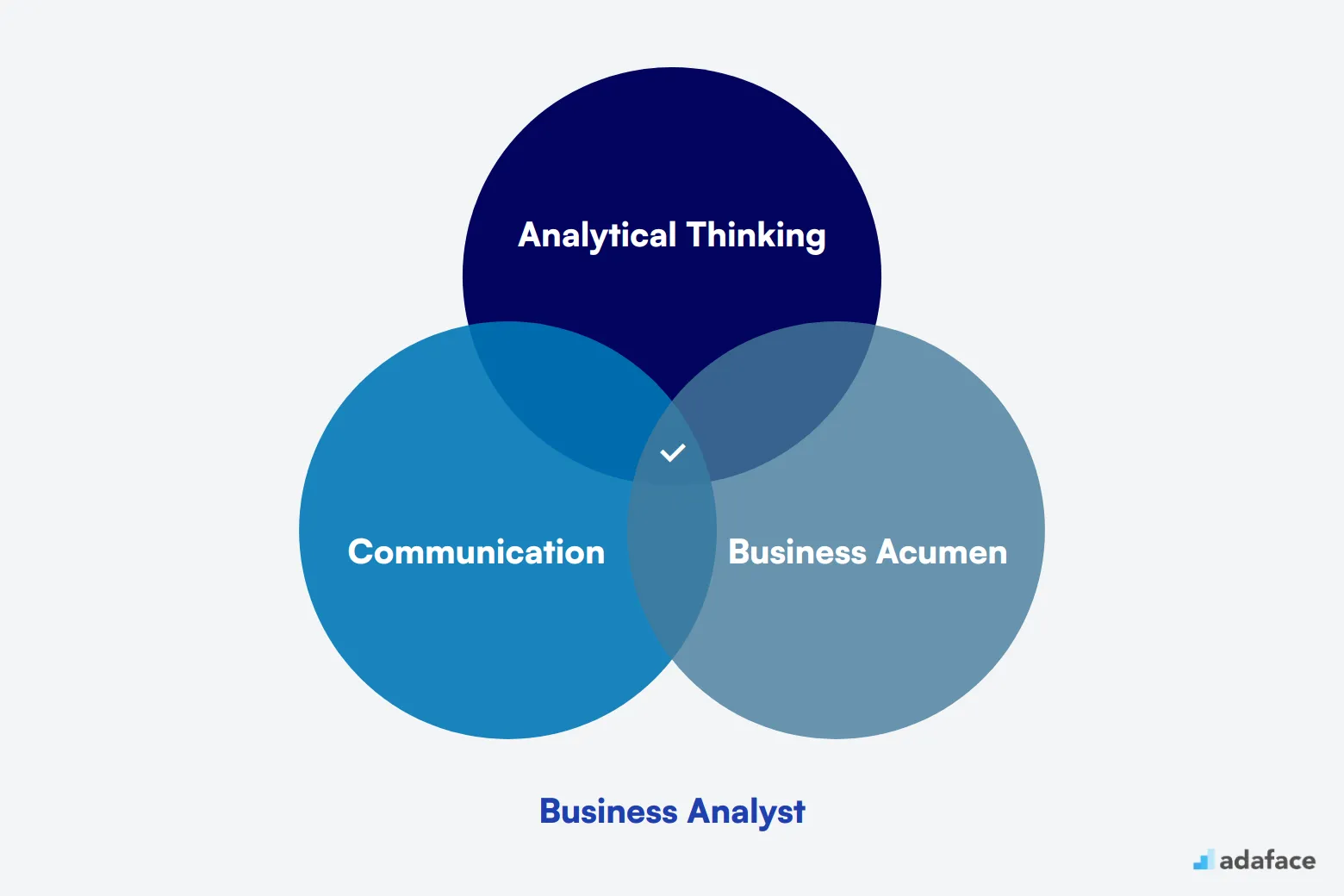
What Does a Business Analyst Do?
A Business Analyst acts as a bridge between business stakeholders and technology teams. They analyze business processes, identify areas for improvement, and translate business needs into technical requirements.
The day-to-day tasks of a Business Analyst include:
- Gathering and documenting business requirements
- Analyzing data to identify trends and insights
- Creating process maps and flowcharts
- Conducting stakeholder interviews and meetings
- Preparing reports and presentations
- Collaborating with IT teams to implement solutions
- Testing and validating new systems or processes
Business Analyst Hiring Process
The Business Analyst hiring process typically spans 4-8 weeks. Here's a quick overview of the timeline and steps involved:
- Post a well-crafted job description on relevant job boards
- Review resumes (expect initial applications within 3-4 days)
- Conduct skill assessments or case studies (about 1 week)
- Interview shortlisted candidates
- Make an offer to the best candidate
Each step requires careful consideration to ensure you find the right fit for your team. In the following sections, we'll dive deeper into these stages, providing checklists and helpful resources to streamline your Business Analyst hiring process.
Skills and Qualifications to Look for in a Business Analyst
When hiring a Business Analyst, creating the right candidate profile is often where many recruiters might misstep. It's essential to clearly distinguish between what is a must-have skill and what's a nice-to-have. Each organization has unique needs, and understanding these requirements is the first step to finding the right fit.
For instance, a Bachelor’s degree in Business, Economics, or related field and strong analytical skills are generally required. However, knowledge of SQL and experience with financial analysis might be preferred depending on your organization's specific projects. This distinction is crucial for building a team that meets your business objectives.
To further aid your hiring process, consider using tools like Adaface's assessment tests to evaluate and map candidates' skills effectively. This ensures you recognize both the required and preferred qualifications in applicants.
| Required skills and qualifications | Preferred skills and qualifications |
|---|---|
| Bachelor’s degree in Business, Economics, or related field | Experience with data visualization tools like Tableau or Power BI |
| Two or more years of experience as a Business Analyst | Knowledge of SQL and database querying |
| Strong analytical and problem-solving skills | Familiarity with Agile methodologies |
| Excellent communication and presentation skills | Experience in financial analysis or budgeting |
| Proficiency in Microsoft Excel and PowerPoint | Strong organizational and project management skills |
How to write a Business Analyst job description?
Crafting a compelling Business Analyst job description is key to attracting the right candidates. Once you have a clear candidate profile, the next step is capturing that information effectively.
- Outline Key Responsibilities and Impact: Clearly define the role's responsibilities and the impact a Business Analyst will have on the organization. Highlighting the strategic value of their work can appeal to professionals looking for meaningful roles. Learn more about detailed responsibilities.
- Balance Technical Skills with Soft Skills: While technical abilities such as proficiency in data analysis tools and understanding business processes are crucial, emphasize soft skills like communication and problem-solving. This balance ensures you attract candidates who are well-rounded.
- Showcase Unique Selling Points: Highlight what makes your company and this role unique. Whether it's innovative projects, growth opportunities, or a collaborative team environment, these details can set you apart from competitors.
Top 10 Platforms to Hire Business Analysts
Now that you have a detailed job description, it's time to list the position on various job listing sites to source candidates. Utilizing popular platforms can help you reach a wider audience and attract qualified Business Analysts who fit your needs.
LinkedIn is ideal for full-time positions due to its extensive professional network and the ability to target candidates with specific skills and experience.

Indeed
Indeed is a popular job board that reaches a wide audience, making it effective for listing full-time Business Analyst positions.

Glassdoor
Glassdoor is useful for full-time roles, as it provides company reviews and salary insights that attract well-informed candidates.
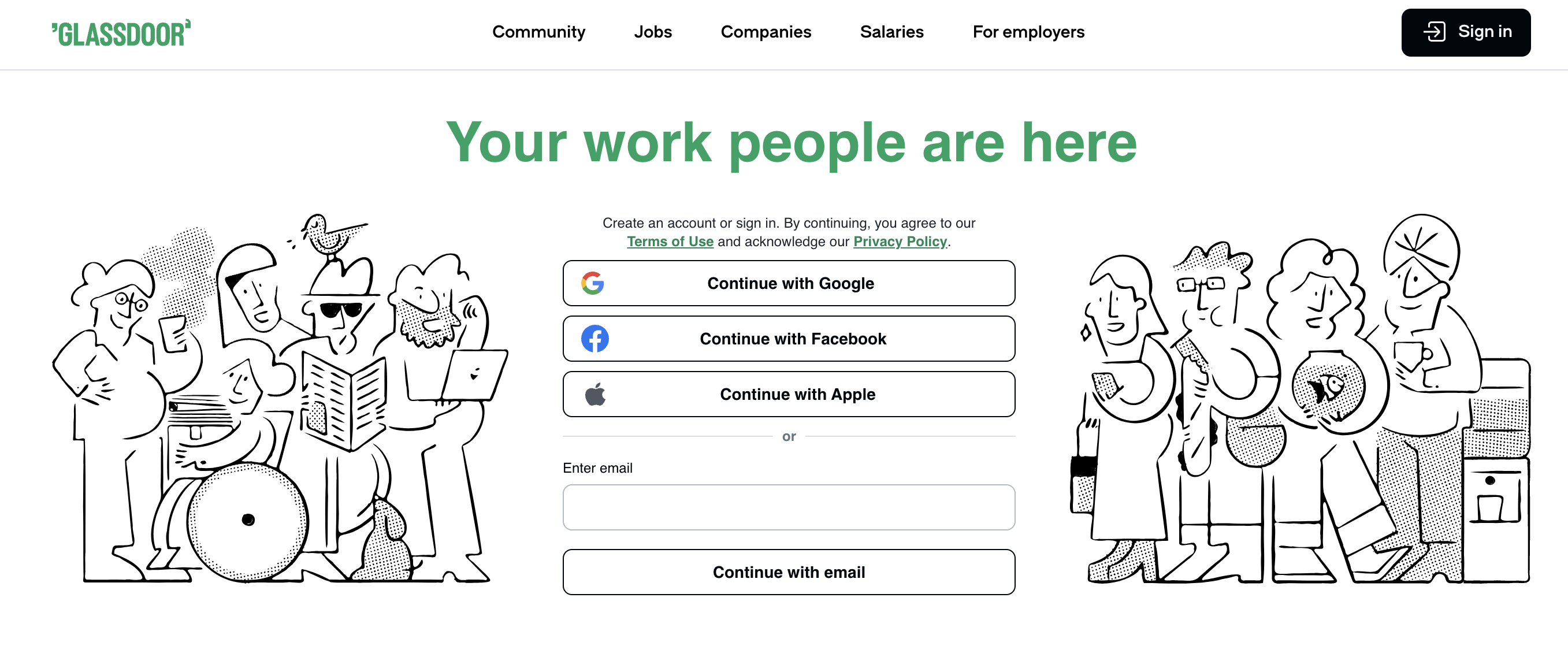
Some of the most effective platforms for hiring Business Analysts include LinkedIn, Indeed, and Glassdoor. These sites are excellent for full-time roles, leveraging their extensive reach and professional networks to connect you with skilled candidates. Additionally, platforms like FlexJobs cater specifically to remote positions, while Upwork and Toptal are ideal for freelance opportunities. Make sure to explore diverse options to find the best fit for your organization.
How to Screen Business Analyst Resumes?
Resume screening is a good way to narrow down your list of potential candidates. Given the volume of applicants for business analyst positions, it’s smart to focus on those who align with your job requirements. This helps you save time and focus on qualified individuals for further evaluation.
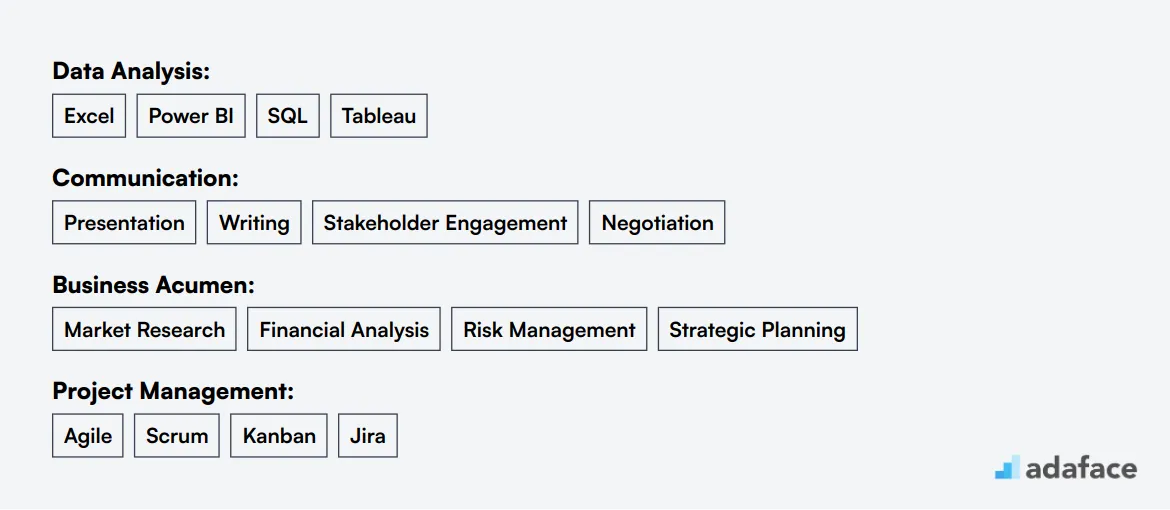
When manually screening resumes, keep an eye out for the right keywords that match the position. Words and phrases such as "Microsoft Excel," "PowerPoint," "analytical skills," and "Proficiency in SQL" should catch your attention. The goal is to identify resumes that highlight relevant skills, so you can focus your efforts on the most promising candidates.
AI tools, such as AI LLMs, can help automate the screening process by pinpointing relevant keywords and matching them with job descriptions. This technology can quickly highlight resumes that meet your criteria, allowing you to proceed with online assessment platforms more effectively.
Here’s a sample prompt for using AI in resume screening:
TASK: Screen resumes to match job description for business analyst role
INPUT: Resumes
OUTPUT: For each resume, provide the following information:
- Name
- Email ID
- Matching keywords
- Score (out of 10 based on keywords matched)
- Recommendation (detailed recommendation of whether to shortlist this candidate or not)
- Shortlist (Yes, No, or Maybe)
RULES:
- If unsure about a candidate's fit, list them as Maybe instead of No
- Keep recommendations concise.
KEYWORDS DATA:
- Excel, PowerPoint, SQL, Tableau
- Communication, Stakeholder Engagement, Presentation
- Market Research, Financial Analysis, Agile
Which skills tests should you use to assess Business Analysts?
Skills tests are an excellent way to evaluate Business Analyst candidates objectively. They help you assess technical knowledge and practical abilities that are key to success in this role. Here are some recommended tests to include in your hiring process:
Business Analyst Assessment Test: This comprehensive test evaluates a candidate's overall business analysis skills. It covers requirements gathering, process modeling, data analysis, and communication skills.
Business Analyst Excel Test: Excel proficiency is often required for Business Analysts. This Excel-focused assessment checks a candidate's ability to work with data, create pivot tables, and perform basic statistical analysis.
Data Interpretation Test: Business Analysts need to make sense of complex data sets. A data interpretation test evaluates a candidate's ability to analyze charts, graphs, and tables to draw meaningful conclusions.
Problem Solving Test: Business Analysts are often tasked with finding solutions to complex business problems. A problem-solving assessment helps gauge a candidate's analytical thinking and creative problem-solving skills.
Communication Test: Effective communication is key for Business Analysts. A communication skills test assesses a candidate's ability to convey complex information clearly and concisely to various stakeholders.
Case Study Assignments to Evaluate Business Analysts
Case study assignments can be effective for assessing Business Analysts, but they come with drawbacks. They're often time-consuming, leading to lower completion rates and potentially losing good candidates. However, when used strategically, they can provide valuable insights into a candidate's skills.
Business Process Improvement: This case study asks candidates to analyze a company's current process and suggest improvements. It tests their ability to identify inefficiencies and propose solutions, key skills for a Business Analyst.
Data Analysis and Visualization: Candidates are given a dataset and asked to extract insights and create visual representations. This assignment evaluates their data analysis skills and ability to communicate findings effectively.
Requirements Gathering: In this scenario, candidates interview stakeholders to gather requirements for a new system. It assesses their communication skills, ability to ask probing questions, and talent for translating business needs into technical requirements.
Structuring the Interview Stage for Business Analyst Candidates
After candidates pass the initial skills tests, it's time for technical interviews to assess their hard skills more deeply. While skills tests are great for initial screening, technical interviews are key to finding the best-fit candidates for the Business Analyst role. Let's look at some sample interview questions to help you evaluate candidates effectively.
Consider asking: 'Can you describe a complex business process you've analyzed and improved?', 'How do you gather and prioritize requirements?', 'What tools do you use for data analysis and visualization?', 'How do you handle conflicting stakeholder needs?', and 'Can you walk us through your approach to creating user stories?'. These questions help assess a candidate's experience, methodologies, technical skills, problem-solving abilities, and communication skills - all crucial for a Business Analyst.
How much does it cost to hire a Business Analyst?
The cost of hiring a Business Analyst varies widely based on location, experience, and industry. In the United States, the average salary for a Business Analyst is around $90,342 per year. This can range from $54,761 for entry-level positions to $132,375 for more experienced professionals.
Keep in mind that salaries can differ significantly between cities. For example, in New York, the average salary is about $107,757, while in Charlotte, NC, it's around $69,224. When budgeting for a Business Analyst, consider factors like location, required experience, and industry standards to determine a competitive compensation package.
Business Analyst Salary in the United States
The average Business Analyst salary in the United States is around $90,342. Salaries can range from approximately $54,761 on the lower end to about $132,375 on the higher end, depending on experience, location, and industry. For instance, salaries in New York tend to be higher, with averages around $107,757, while in Charlotte, NC, they average around $69,224.
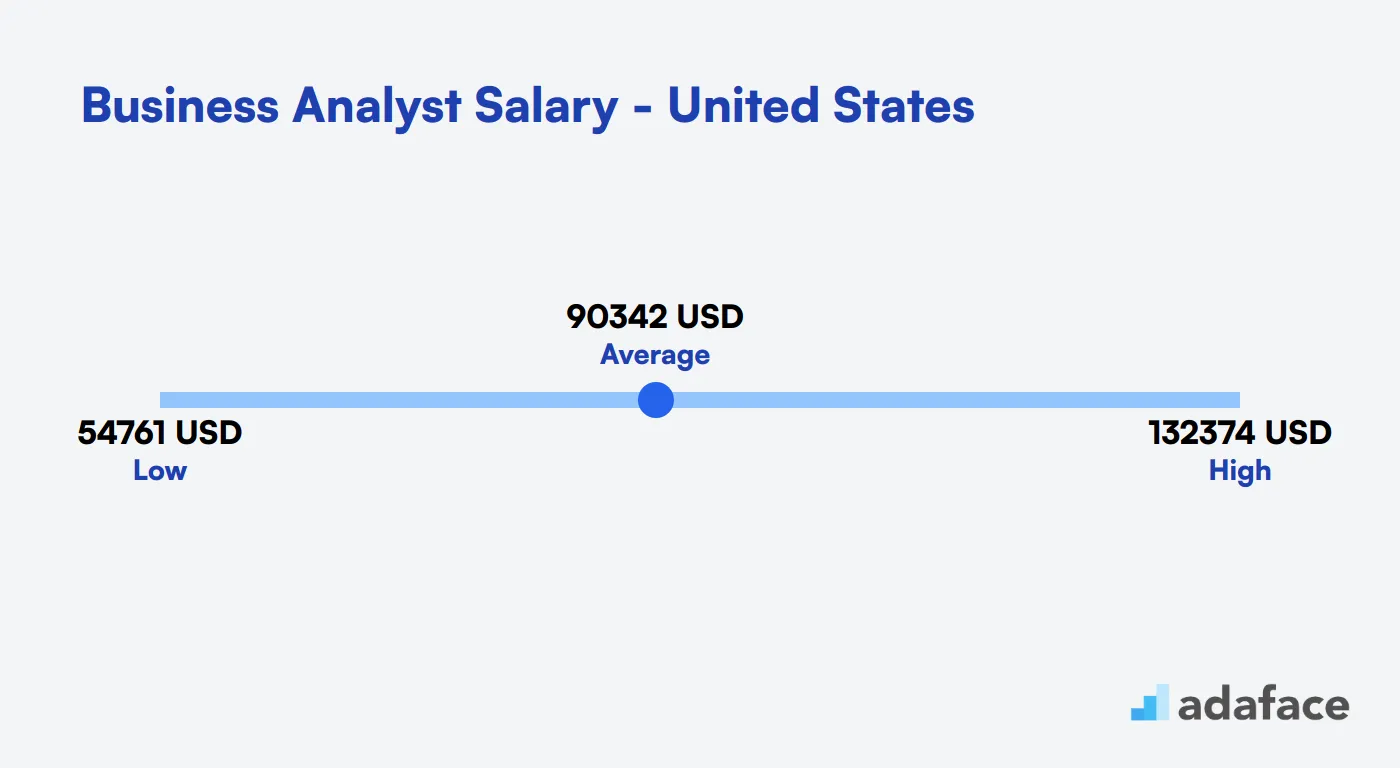
Business Analyst Salary in the Philippines
The average salary for a Business Analyst in the Philippines is around ₱682,533 per year. Salaries can range from a minimum of ₱296,539 to a maximum of ₱1,176,539, depending on the location and level of experience. Major cities like Mandaluyong and Pasay report median salaries of approximately ₱837,702 and ₱746,895, respectively, reflecting the higher demand in urban areas.
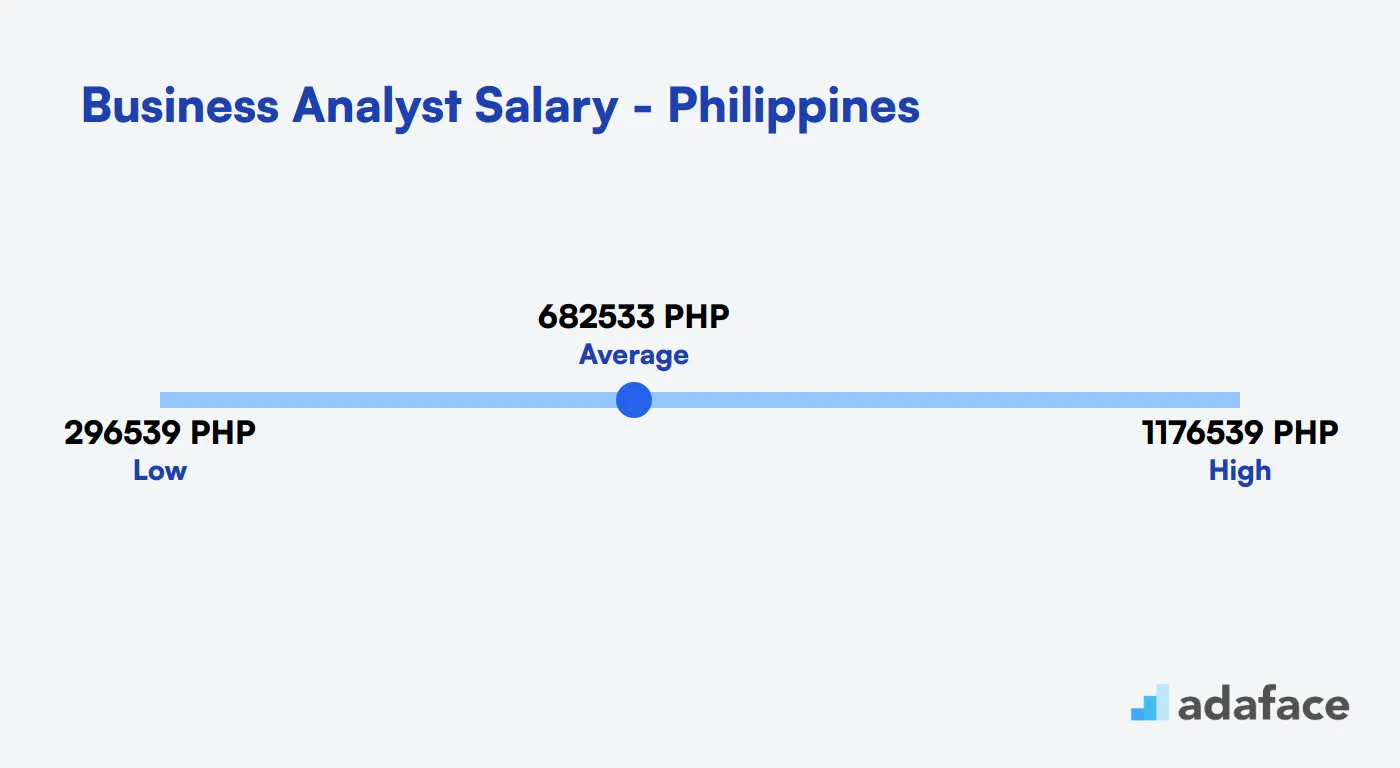
What are the ranks of Business Analysts?
Navigating the hierarchy of Business Analyst roles can often be confusing, especially when these positions have overlapping responsibilities. Understanding the various ranks can help recruiters and hiring managers identify the right fit for their team.
- Junior Business Analyst: Typically an entry-level position, a Junior Business Analyst assists with data collection, prepares reports, and supports the decision-making process. They often work under the supervision of more experienced analysts.
- Business Analyst: This mid-level role involves analyzing business processes, identifying areas for improvement, and helping to implement solutions. Business Analysts often work closely with stakeholders to understand their needs and provide actionable insights.
- Senior Business Analyst: A Senior Business Analyst not only handles complex projects but also mentors junior team members. They have the experience to lead strategic planning and provide high-level insights that guide company decisions.
- Lead Business Analyst: In this leadership role, the Lead Business Analyst oversees project teams, coordinates cross-departmental activities, and ensures that business objectives align with technological solutions. Their strategic vision supports the organization's growth.
- Principal Business Analyst: At the top tier, a Principal Business Analyst plays a critical role in shaping business strategies and driving innovation. They advise upper management and take on high-impact projects that influence the company's direction.
For detailed descriptions of these roles, you can refer to Business Analyst Job Description.
Hire the Best Business Analysts for Your Team
Throughout this guide, we've explored the various aspects of hiring a Business Analyst, from understanding their role and responsibilities to crafting the perfect job description and identifying the necessary skills and qualifications. By following these steps, you can ensure a streamlined process for attracting talented professionals who can drive your business forward.
The key takeaway from this is to prioritize creating accurate job descriptions and leveraging skill assessments to ensure you hire the right candidate. Utilizing the right skills tests, such as a Business Analyst Assessment Test, can significantly improve your chances of finding the perfect fit for your organization. Focus on these strategies to build a team that meets your specific needs and contributes to your long-term success.
Business Analyst Aptitude Online Test
FAQs
Key skills for a Business Analyst include analytical thinking, communication, problem-solving, technical aptitude, stakeholder management, and requirements gathering. Look for candidates who demonstrate a balance of these skills along with relevant domain knowledge.
When screening resumes, focus on candidates with a mix of business and technical backgrounds. Look for experience in requirements gathering, data analysis, and project management. Pay attention to specific tools and methodologies mentioned, and consider using our Business Analyst Test to validate their skills.
Ask questions that assess analytical skills, problem-solving abilities, and communication style. Include scenario-based questions to evaluate how they handle real-world situations. For a comprehensive list, check out our Business Analyst Interview Questions guide.
Use a combination of technical interviews and practical assessments. Our Business Analyst IT Test can help evaluate their technical proficiency. Additionally, consider giving them a small case study or data analysis task to complete.
Be cautious of candidates who can't explain complex concepts simply, lack examples of successful project outcomes, or show poor attention to detail. Also, watch for those who don't ask insightful questions about your business or seem inflexible in their approach to problem-solving.
While industry experience can be valuable, it's not always necessary. Look for candidates with transferable skills and the ability to quickly learn new domains. A strong analytical mindset and adaptability are often more important than specific industry knowledge.
A skilled Business Analyst should be proficient in data analysis tools like Excel, visualization tools like Tableau or Power BI, and project management software. Familiarity with requirements management tools and basic understanding of SQL can also be beneficial. Our Business Analyst Excel Test can help assess their proficiency in this key tool.

40 min skill tests.
No trick questions.
Accurate shortlisting.
We make it easy for you to find the best candidates in your pipeline with a 40 min skills test.
Try for freeRelated posts
Free resources



